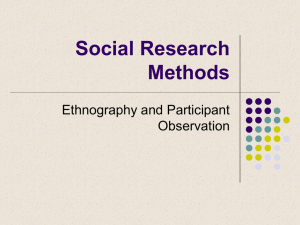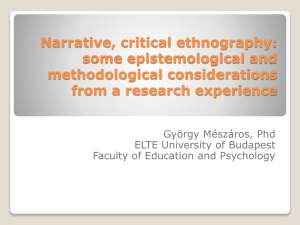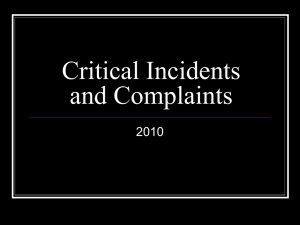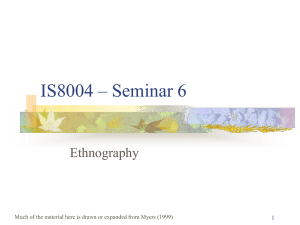Critical Incidents
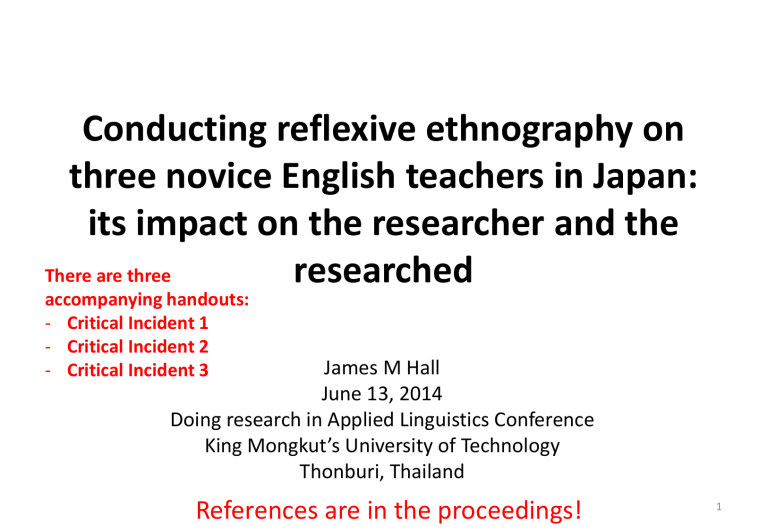
Conducting reflexive ethnography on three novice English teachers in Japan: its impact on the researcher and the
There are three accompanying handouts:
- Critical Incident 1
- Critical Incident 2
- Critical Incident 3
researched
James M Hall
June 13, 2014
Doing research in Applied Linguistics Conference
King Mongkut’s University of Technology
Thonburi, Thailand
References are in the proceedings!
1
Conducting reflexive ethnography on three novice
English teachers in Japan: its impact on the researcher and the researched
Organization of this Presentation
1.
My Background and Today’s Purpose
2.
Research Design
– Framework of inquiry: linguistic ethnography
– Focus of investigation: The participants, their development, mediating context
3.
Methods of Data Collection and Analysis
– Critical Incidents
– Accumulated Data
– Strategies for Analysis
4.
Issues in Collaboratively Collecting and Interpreting Critical Incidents
5.
Impacts on Researcher and Researched
2
Researcher Background and Today’s Purpose
Who am I?
• James Hall: US born and raised English teacher educator living in Japan
The research I am conducting is…
• 18 month study: describing the dilemmas junior high school teachers face in encouraging student learning and how they identify and resolve these dilemmas.
Today I will discuss
1.
Issues I have in
– research strategy (Linguistic ethnography)
– methods of data collection and analysis
– Interpretation
2.
The impact this study has had on the researcher and researched
Today’s purpose
To discuss my research with peers and get feedback to improve this study
3
2. Research Design
Framework of inquiry: Linguistic Ethnography
Linguistics serves to tie ethnography down and ethnography to open linguistics up .
(Rampton et al., 2004)
Eclectic:
Linguistics, ethnography, other areas of inquiry
Linguistics
Analytic Resources
- Discour se analysis
- Conversation analysis
Ethnography
Insider perspective
Reflexivity
Other Academic Disciplines
Sociocultural theory
4
2. Research Design: Participants
Teacher
Risa
Education
Bachelors in
English Literature
Experiences
One month abroad
Four -week teaching practicum
Educational Goals
Students understand interest and value of communicating in English
Maiko
Yuta
James
Bachelors, English Education
Study abroad, TESL
Professional experience working abroad
Part-time JHS and HS teaching experience
Two-week teaching practicum
No experience abroad
2013 Masters in English
Education (Vocabulary
Acquisition)
2011, Bachelors in English
(Education)
Masters, International
Education
Research student, Japan
PHD candidate, applied linguistics
15 Years if Japan: JHS Assistant
Language Teacher, Student, HS
Instructor, University Lecturer in English Education
To be able to speak English and to work in an international society.
Not disclosed + retired from teaching
Teach student teachers how to conduct “balanced”
English classes.
5
2. Research Design:
Focus of Investigation: The Teachers, Their
Development, and Mediating Context
Physical vs.
Symbolic
CLT, character development
Social interaction
Novice Teachers
Teacher of Teachers
(Lantolf & Thorne,
2006)
Problem identification → generating solutions → testing solutions
Reflective practice
Survival & Discovery
Learning to work with novice teachers
Outcome
Teacher Development
TOT Development
Active listening
Dialogic discussion
6
3. Methods of Data Collection and Analysis:
Critical Incidents (Tripp, 1993)
What artifacts, concepts, activities mediate how teachers handle these dilemmas?
Critical Incidents
Critical Incidents
In TEFL
“An unplanned and unanticipated event that occurs during a lesson and that serves to trigger insights about some aspect of teaching and learning”
(Richards & Farrell, 2005)
In this study:
An event or accumulation of events identified by the teacher or
TOT that sparked in the teacher a quandary about how to proceed in facilitating student learning.
7
3. Methods of Data Collection and Analysis:
Accumulated Data
Classes viewed between October, 2013 and May, 2014
Teacher Classes viewed Audio Video
Maiko
Risa
Yuta
9
9
8
4
5
4
3
2
0
Only
Field
Notes
2
2
4
Transcriptions +
Field Notes
7
7
4
Interviews Conducted Between October, 2013 and May, 2014
Audio Transcriptions Notes
Teacher
Maiko
Interviews
8 8 8
Risa
Yuta
8
7
8
5
8
5 2
8
3. Methods of Data Collection and Analysis:
Identify and Analyze Critical Incidents
1. Identify critical incidents
– Anything unanticipated that occurred in the class
– Identified by teacher or researcher (Angelides, 2001)
2. Probe critical incidents with teacher (in interview)
– cause, significance, resolution
3. Interpret an accumulation of critical incidents (What are the major dilemmas the teachers faced, how did they resolve them, and how did they change?)
9
4. Issues in Collaboratively Collecting and
Interpreting Critical Incidents
• Critical Incident 1 : Summer or winter?
• Critical Incident 2 : Are you a Giants fan?
• Critical Incident 3 : Writing a Diary
10
4. Issues in Collaboratively Conducting this Linguistic Ethnography using CIs
1. Three ways to discuss Critical Incidents with teachers
– The researcher brings up a critical incident in an interview after class (CI 1)
– The researcher elicits CIs in the interview after class (CI 2)
– The researcher writes up CIs and discusses them with the teacher (CI 3)
2. The CIs shown here demonstrate how teachers’ interaction with students, understanding of materials, influence their problem solving.
3. CIs provide a focus for the interviews.
4. Dilemmas that teachers face often originate outside of the classroom, can these dilemmas be revealed through CIs?
11
5. Impact on the Researcher and
Researched
• From interviews: the Researcher has been impacted
• Decision made while writing this paper: get the participants more involved (Davies, 2008)
– Better data
– Benefit the participants
12
References
• Please see the proceedings.
13



